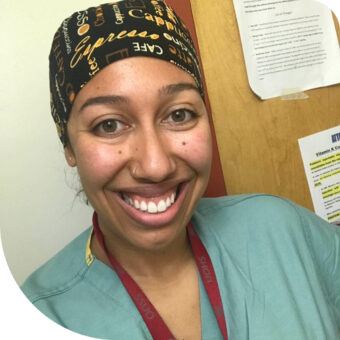Harnessing Skills Fueled by Science
Growing up in Hull, Québec, Dr. Sabrina Lee remembers a high school career planning workshop in which all of her results recommended various careers in healthcare. One result, working as a cardiothoracic surgeon, piqued her interest in medicine. The intellectual challenge, autonomy and responsibility that comes with being a physician, on top of her family’s history of working in healthcare, motivated her to pursue this career path. She remembers being inspired when watching her mom, a respiratory therapist, care for patients with a constant sense of purpose in service of others. Dr. Lee graduated with both her undergraduate and medical degrees from the University of Ottawa and did both of those degrees en français.
Dr. Lee sought a hands-on career “harnessing skills fueled by science to help others”. The combination of her passion for social justice and her love of surgery drew her to specialize in Obstetrics and Gynecology. She wants to do her part to improve the inequities and disparities based on gender.

As a Black female medical learner Dr. Lee is often the only Black person in the room, which can feel lonely at times and can also result in imposter syndrome. She grapples with whether or not her reactions to people or their reactions to her are “individual or speak to broader biases, unconscious or otherwise”. Always aware of how others perceive her, Dr. Lee says “you end up wondering how your words and actions are interpreted, and how being both a woman and being racialized plays into those impressions.”
Routinely mistaken for hospital housekeeping staff, Dr. Lee has faced racism and overt discrimination from and towards colleagues and patients, often impacting the rest of her day. These interactions create an internal struggle on how to navigate each situation and she struggles with whether or not she should speak out. If she does find the courage and the energy to gently challenge these comments, will it have any effect? She points out that these types of micro and macro aggressions can be more impactful “when they are about people who look like you or like your family”. She hopes the interactions with individuals who make assumptions about her role at the hospital, which likely does not happen to all of her colleagues to the same extent, causes them to reflect and reconsider their expectations.
As a result of the lack of representation, Dr. Lee underlines the heavy minority tax that comes with “living at the intersection of multiple traditionally marginalized identities.” She feels that people from these traditionally excluded groups often carry heavy loads of “equity, diversity and inclusion” type of work and may “feel a certain responsibility to give back and lift the community up even at the expense of our own balance or learning.” Ultimately, she values the opportunities to offer mentorship and to discuss health equity. She hopes to see continued diversity and reform within the medical community with initiatives such as the Truth and Reconciliation Action Plan PGME Committee, through which she has been involved in developing residency curriculum to combat anti-Indigenous medical racism.
Dr. Lee believes that diversity in medicine is life-saving. If the faces of doctors do not reflect the diversity of the population, she believes we are likely missing critical perspectives that impact health outcomes. She encourages Black youth who want to have a fulfilling career, with “incredibly rewarding encounters with patients and colleagues” to consider a career in medicine. Perhaps the best advice might be what she would give to her 18 year old self. “Believe in yourself. Keep working hard and the hustle will pay off. Find the community that will be your raft. Holding onto those people will get you through.”

Still early in her career, Dr. Lee says her greatest professional accomplishment is completing each day towards her goal, “pushing through on the days I feel most tired, laughing with my colleagues on the days I feel most burnt out, providing compassionate patient care on the days I feel less inspired, and hitting the books to gain important skills that will serve me even when I feel unmotivated.” She is proud of the work she does every day to be resilient and resistant, and to break the cycles of intergenerational trauma she carries. These efforts have not gone unnoticed, as demonstrated by her receipt of the Ryan Program Resident Award for Excellence in Family Planning in both 2020 and 2021, her completion of an MSc in Sexual & Reproductive Health Research at the London School of Hygiene & Tropical Medicine with Distinction, her successfully defended thesis for a second master’s in Health Services Research at the University of Toronto, and her recent recipient status of the Manitoba Medical Services Foundation (MMSF) Operating Grant to investigate experiences of seeking abortion care in those living far from services.
After residency, Dr. Lee plans to stay in Winnipeg to work as a generalist obstetrician-gynecologist. She hopes to have an academic practice, focusing on family planning and providing safe care to patients from marginalized communities. She is particularly looking forward to serving the Black community in Winnipeg as a gynecologist. When she is not practicing medicine, Dr. Lee enjoys spending time with her partner Keith and their two furry companions, Alice (a goofy and gentle husky-malamute mix) and Wilfred (a Velcro cat with a big personality). She has played volleyball since she was 11 years old and it remains an important part of her life. She loves to travel, is a brunch enthusiast and enjoys good cinematography. Recognizing the health risks if she were to eat it too regularly, Dr. Lee’s top restaurant dish is the classic poutine at La pataterie hulloise in her hometown.